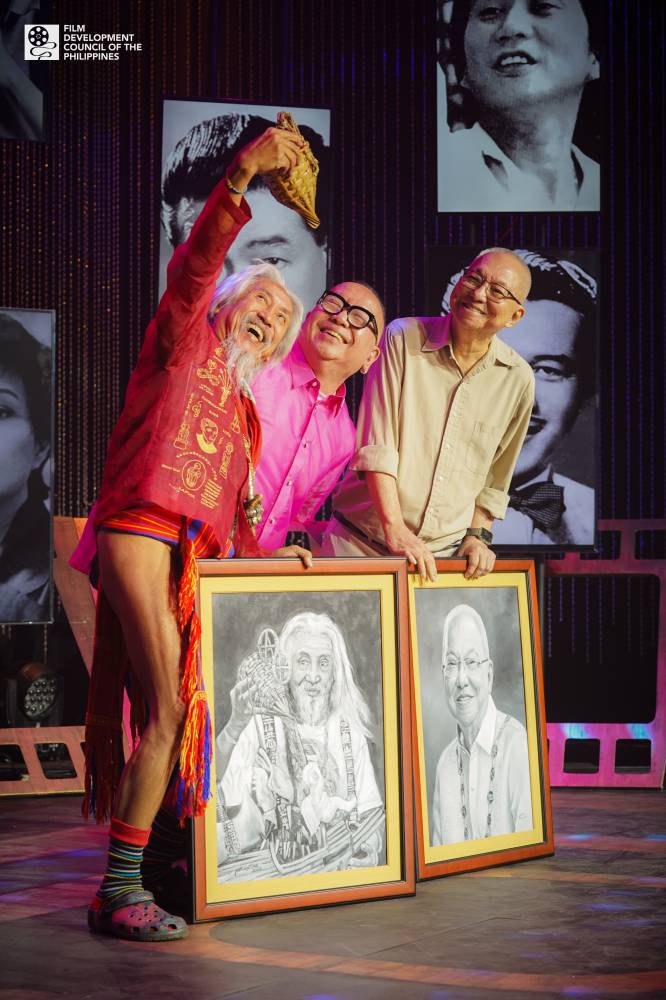Ricky Lee’s ‘persistence,’ Kidlat Tahimik’s ‘indio-genius’

FDCP chair Jose Javier Reyes (center) presents portrait paintings to Kidlat Tahimik and Ricky Lee. —FDCP
We stand on the shoulders of these giants … We wouldn’t be here if it weren’t for them.”
Thus said Film Development Council of the Philippines (FDCP) chair Jose Javier Reyes in his speech at the agency’s recently held gala night honoring the country’s 11 national artists for film.
For their “invaluable contributions to the growth and success” of local cinema, the late Lamberto Avellana, Gerry de Leon, Lino Brocka, Ishmael Bernal, Eddie Romero, Fernando Poe Jr., Manuel Conde, Marilou Diaz-Abaya; and living stalwarts Nora Aunor, Ricky Lee and Kidlat Tahimik were feted with video and musical tributes showcasing the many triumphs of their illustrious careers.
“Every national artist represents the changes happening in our society, politics, culture. That’s why cinema is important. It gives soul to the Filipino identity,” Reyes said. “From their works will come future geniuses and Filipino talent.”
Held as part of the 4th Philippine Film Industry Month, the event was attended by family members of the late honorees, like actress Lovi Poe (daughter of Fernando Poe Jr.) and singer-actor Janno Gibbs (grandson of Gerry de Leon).
Article continues after this advertisementOne of the night’s highlights was the unveiling of portraits by renowned Filipino visual artists Teofilo Montifar, Teresita Dimanlig-Torda and Grandier Gil Bella for the three living national artists.
Article continues after this advertisementTahimik and Lee personally accepted theirs. Aunor, however, couldn’t make it to the event.
“Smile!” said Tahimik as he playfully pointed his constant companion—a ‘bamboo camera’ made of an Ifugao fish trap and mock bamboo reels—to the adoring crowd.
“This has always been a symbol of telling my stories from my point of view,” he said.
Breaking conventions
Tahimik, whose real name is Eric de Guia, is regarded as the “Father of Philippine Independent Cinema,” whose experimental works advocated for indigenous cultures and broke the conventions of filmmaking.
He doesn’t see himself as part of the industry as we know it, but still he was thankful for the recognition.
“It’s a big honor to be with the industry people. For years and years, I have always made it clear, especially with the youth, that I’m not a part of the industry. This isn’t out of snobbishness. I’m just all about creating and playing,” said the filmmaker, whose notable works include “Perfumed Nightmare” (1977) and “Turumba” (1983).
“The film industry has evolved and there are a lot of talented scriptwriters and storytellers coming out. And through this bamboo camera, we will continue to tell our stories,” he said. “Ilalabas natin ang ‘indio-genius!’”
Lee’s formidable body of work as a screenwriter includes some of the country’s most important movies such as “Jaguar” (1979), “Himala” (1982) and “Moral” (1982). And while he has been in the industry for five decades now, he shows no signs of slowing down.
He recently cowrote two film entries—“Green Bones” and “Himala, Isang Musikal”—to this year’s Metro Manila Film Festival. He just launched a new book, “Kalahating Bahaghari,” and is working on his memoir, among other future projects.
Feeling alive again
“The persistence is still there … I feel better when I’m creating. I get restless when I’m not doing anything. I can’t sleep. I feel like I don’t have a purpose. But once I start thinking about my future projects, I feel alive again,” said Lee, who also plans to resume his free workshops for aspiring screenwriters.
“I can say that through the decades, from ‘Jaguar’ (1979) onwards I never stopped creating,” he added. “Through ups and downs, victories and rejections, through terrible moments … don’t stop.” INQ
